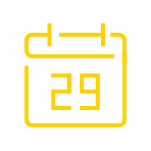About your MA Early Childhood Education
Our masters in early childhood education focuses on early childhood education from birth until eight years old and is ideal if you currently work with children or if you have a degree in early childhood studies, pre-school education, or a relevant subject. You'll develop the tools to enhance your career and make a real difference.
Anglia Ruskin University has been named as one of the UK’s top ten universities for Education courses in the Guardian League Table 2023.
Course highlights
- Gain expert knowledge and critical understanding of early childhood education
- Develop specialist knowledge in your chosen area of expertise
- Learn from experienced and passionate higher education professionals
- Choose to study over 1 or 2 years depending on your other commitments
How you'll study
This course is studied 100% online30th April 2024
Fees: £8,200
Payment plans availableCourse overview
Our online masters in early childhood education is ideal if you're passionate about making a positive impact on young children's education. The course will give you the expert knowledge, skills, and understanding to help you achieve your career aspirations and supported online study allows you to have the flexibility to learn around your other commitments.
This distance learning early years masters degree presents you with a fantastic opportunity to explore aspects of young children’s development in more depth, examining current policies and practices to build on your existing knowledge.
This masters course will advance your understanding of young children’s learning and develop and inform your early years practice and professionalism. Our masters in early childhood education also provides the opportunity to develop specialist knowledge in your chosen area of expertise to support your own career success.
Taught by experienced tutors who are passionate about using insights from research to enhance the lives of young children and their families, this masters in early years education consists of four key modules and a postgraduate major project. You'll explore key topics such as early childhood principles and practice, exploring and developing educational research, and specialist studies in learning and teaching. The major project gives you the opportunity to carry out a significant piece of work related to your specialist area.
You’ll be able to link your newly-learned theories and research with your practice from the start, boosting your contribution to your workplace and enhancing your career prospects. It’s also a great starting point if you’re looking for a career in academia and is a step towards a PhD or EdD.
The successful completion of this distance learning early childhood and education degree can support a wide range of career opportunities in the early years sector, enhancing your existing role, and supporting your future career aspirations.
You may also be interested in the following courses:
MA Education with Leadership and Management
MA Education with Special Educational Needs and Disability
Our advisers will be happy to answer any questions you have about the MA Education with Early Childhood course, studying online or any other aspect of distance learning.
Modules
Due to the structure of this course, there will be instances where you will study two modules simultaneously during a trimester. You will be supported by your tutors to help manage your workload and assessment deadlines.
Please contact one of our advisers to discuss the pacing of this course and the options available to match your circumstances.
Exploring Educational Research
This module is designed to familiarise you with the various research methods that you may read about, critique, and use during your online postgraduate course in early childhood education and beyond. It’ll provide a forum for exploring, discussing and evaluating different types of educational research. You’ll have the opportunity to: look at a range of research methodologies; to find, read and review research studies; and to discuss the relevance of research for practice in education across different sectors (from birth to life-long learning). You’ll be encouraged to learn about research methodologies and methods through critical reflection on published work.
Specialist Studies in Learning and Teaching
This module will enable you to explore a subject that is relevant to your role as a teacher in compulsory or post compulsory education. You will be required to focus on one of the specialist areas provided by the course team and to work with other students to successfully achieve the learning outcomes. You will choose from a range of subject specialisms which will include but not necessarily be limited to: Developing Assessment for Learning in the classroom context; Enhancing learning and teaching using learning technologies; Supporting students with Special Educational Needs; Outdoor Learning; Critical Education and Social Justice.
Early Childhood - Principles, Practice & Professionalism
In this module, early childhood is considered from a range of contemporary perspectives. You will examine and critique theories from developmental psychology and be introduced to ideas from the new sociology of childhood. Students will examine the work of pioneer early educators and more recent pedagogies, curricula, and practices from a range of countries, mindful of the importance of indoor and outdoor play experiences. The dynamics of leadership and management will also be explored.
Developing Educational Research
You’ll be supported to develop a high-quality research proposal to implement for your postgraduate major project. A workbook approach will guide you through the various elements that need to be considered during the process of planning and preparation for a small-scale educational research study. There will be opportunities to discuss your ideas with your tutor and peers and to present your developing research proposal for feedback. You’ll also learn by giving constructive feedback to your peers. By the end of the module, you’ll be prepared to submit an application for ethical review, to the appropriate research ethics panel, and to embark upon research for the postgraduate major project.
Postgraduate Major Project in Education
The Major Project enables you to demonstrate your ability to raise significant and meaningful questions in relation to your specialism which may involve working at the current limits of theoretical and/or research understanding. It’ll involve the ability to develop solutions to ethical dilemmas likely to arise in your research or professional practice. Gaining an understanding of an appropriate methodology, appropriate methods, and an ability to draw meaningful and justifiable conclusions from information that may be complex or contradictory. Expand or redefine your existing knowledge, to develop new approaches to changing workplace situations and/or to contribute to the development of best practice. You’ll communicate these processes in a clear and elegant fashion and evaluate your work from the perspective of an autonomous reflective learner. Research topics will be negotiated with your appointed supervisor. The project may take the form of a written dissertation, a formal presentation and full research paper, an exhibition, a performance, an artefact, or the development of software, or other written, aural, or visual material. The project may be formed from a combination of these modes but will normally include a written component.
Modules are subject to change and availability.
Assessment
Instead of sitting exams, you’ll benefit from preparing high-quality written assignments. These build up throughout each module, with opportunities for peer and tutor feedback as you learn. You’ll develop core strengths in valuable appraisal methods, such as the ability to carry out individual and collaborative critical reflections. You’ll also carry out enquiries applied directly to your specific interests and context. Each assignment will progress your learning, assessing your ability to communicate with clarity, both verbally and in written reports aimed at a range of audiences.
How you'll study
Our Education with Early Childhood MA is studied 100% online.
You’ll study through Canvas, our world-class online Learning Management System (LMS), which can be accessed from your phone, PC, or tablet both at home or on the move. Our virtual learning environment provides instant access to study materials, forums, and support from tutors and classmates, as well as enabling easy submission of your assignments.
You can choose to study our MA Education with Early Childhood Studies over 1 or 2 years. Please note that if you choose the 1-year option this is the equivalent of full-time study and may be a challenge if you’re employed full-time or have other life commitments. Our advisers will be happy to talk through your options in more detail.
On successful completion of your studies, you’ll be invited to attend a graduation ceremony on campus. If attending the ceremony in person is not possible then we’ll arrange to have your certificate sent to you.
Supported distance learning
We understand that distance learning is different to traditional campus study and if you’re new to online study you may have concerns or apprehensions about studying your Masters in Early Childhood Education remotely, and that’s natural.
To help put your mind at ease we have a dedicated Distance Learning Support Team to help and support you throughout your time at ARU, starting with your first online induction and staying with you right through to graduation. In addition, you’ll also be supported by specialist early childhood education tutors, well experienced in supporting distance learning students.
Once you start your Masters in Early Childhood Education, we encourage the creation of online communities and many of our learners find these connections with others invaluable, helping them to stay motivated, share concerns or make new friendships.
Contact us to talk through any questions or concerns or visit our support page for more information about the support services available.
Be part of the University of the Year
We're proud to be the Times Higher Education (THE) University of the Year 2023.
The prestigious THE awards honour ’exceptional performance during the 2021-22 academic year, and reflect ARU’s success in delivering high-impact projects during this period, despite the challenges of the Covid-19 pandemic.
The award recognises the difference we make in the region and our communities – while also acknowledging the broader impact of our world-leading research, and the contributions our students and graduates make to society.

Careers
What will a masters in early childhood education do for my Career?
Being an early years teacher is one of the most rewarding vocations there is, and this Masters in early childhood education is designed to build upon your existing knowledge, experience, and qualifications to open up leadership and management positions. You will have the opportunity to strengthen your CV, thus making you a more attractive candidate to prospective employers.
If you’re happy with your current position but looking for new ways to handle challenges in the ever-evolving field of early childhood education, this course will expose you to current research methodologies and up-to-date theories on educational practice which will allow you to future proof your career and strengthen your abilities in your current role.
When undertaking a postgraduate degree through distance learning, skills such as time management, communication, and critical evaluation are essential. While you will have begun to develop these skills through your previous educational experience and career, our degree programme will help strengthen this vital skill set.
What job roles can I consider with an Education with Early Childhood MA?
The Education with Early Childhood MA course is for those already working in an Early Years setting and may be considering progressing their career towards specialism, mentoring, consultancy, leadership, or the academic arena.
Examples of job profiles graduates may consider include:
- Education Consultant
- Deputy Head or Head Teacher
- Specialist Co-ordinator
What skills will I get from an Education with Early Childhood MA to help my career?
Choosing to study an Education MA will give you many transferable skills; here are just some of them:
- Develop analytical and evaluative skills
- Apply theory and research into practice
- Group and team working
- Reflect critically on professional practice
- Design and conduct research study
- Hone communication skills.
What can I study after a masters in early childhood education?
Depending on your long-term goals and interests you may decide to explore other postgraduate courses, such as a doctorate qualification. Having a masters degree is a key entry requirement for this higher level postgraduate programme.
Careers Advice Service
Once you become an ARU student you will be able to access our Employability service to help you, whatever stage of your career, whether that’s landing your dream job or the next progression step.
We offer:
- careers advice, including one-to-one online and telephone appointments with our experienced advisers
- help with your CV, job searches, applications, and interview preparation
- an online portal packed with useful careers resources
- our Employability Programme, which helps you hone the skills employers say they want in graduates.
Entry requirements
You’re expected to have a first degree, with honours, at a minimum final classification of Lower Second (2:2) or equivalent.
You will be required to obtain a satisfactory enhanced Disclosure and Barring Service (DBS) check through the University.
If you have lived outside of the UK for 6 months or more within the last 5 years, then you will need to provide a police check from the country/countries previously resided in.
If you are completing placements overseas you will be required to obtain a police check/certificate of good conduct from the relevant country.
If English is not your first language you will be expected to demonstrate a certificated level of proficiency of at least IELTS 6.5 (Academic level) or equivalent English Language qualification, as recognised by ARU.
As a distance learner, you’ll also need a suitable computer with internet connection, together with sufficient IT competence to make effective use of word processing, internet and email.
Please note: Our published entry requirements are a guide only and our decision will be based on your overall suitability for the course as well as whether you meet the minimum entry requirements. Other equivalent qualifications may be accepted for entry to this course.
Fees & funding
Fees
The full tuition fee for this early years masters is £8,200.
The tuition fees you pay each year will be between £4,100 and £8,200 depending on how long you take to complete the course. You can choose to study our Education with Early Childhood MA in either 1 or 2 years.
Accredited Prior Learning may reduce the tuition fees. This will be confirmed once your application has been submitted.
Funding
Your MA early childhood education can be fully funded by the Postgraduate Student Loans now available (subject to eligibility).
We offer payment by instalments, so you can spread the cost of studying with us.
For military students: You can use your ELCs towards this course. ARU is a recognised ELCAS provider (number 1007). Please contact your Learning Centre for details of ELC, eligibility and how to apply.
For more information on how you fund your studies please see our funding page.
What our students say
ARU is a well-established, internationally recognised University. I chose to do a degree here to improve my career opportunities and personal aspirations of becoming a teacher.
Campus learning was not an option for me, but distance learning allowed me to study from the comfort of my own home.
I am very proud of myself for finally accomplishing what I have been meaning to do for many years.
The level of support ARU offers is world-class.











